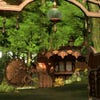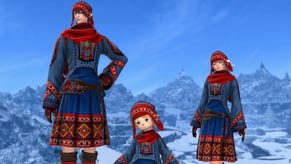Final Fantasy XIV Online
A whole new world.
If this sounds like a pretty high level of handholding through the first segments of the game, well, it is - but you'll be thankful for it, because even seasoned MMO veterans will undoubtedly be thrown by some of the game's more curious systems. Take guildleves, for example. These are quests which are picked up from the counter at the Adventurer's Guild, and then activated by approaching a crystal in the nearest encampment to your quest goal (these crystals also serve a variety of other functions, including teleporting you around the world).
In the beta, at least, these "levequests" form the backbone of the leveling experience - both for your combat jobs, and for your crafting or gathering professions. You can tweak the difficulty level of the quest dynamically depending on how many people are in your party, which is a nice touch, and the quest will give you an indicator on the map showing you where your objectives are. Levequests can be refreshed every 48 hours at the Adventurer's Guild, and there's some kind of system for swapping new quests for old which claims to yield bonuses if you do it right, although I never quite got to the bottom of what that might involve.
This is a pretty solid system for dispensing quests to players. It's also entirely contrary, of course, to the way most other MMOs do it - but will instead be familiar to players of, for example, Final Fantasy XII, whose beast hunt optional quests used a similar system. This sets a pattern that you'll find running through most of Final Fantasy XIV.
The beating heart of the whole game, to give a prescient example, is the job system. Final Fantasy XI, taking its cues from games in the franchise as old as 1990's Final Fantasy III, allowed every character to play multiple job roles, rather than forcing you to roll a new character in order to switch classes. XIV takes this concept to new levels - you no longer have to go back to your home city to change class, but can instead swap between roles dynamically simply by changing the weapon in your main hand.
Equip a greataxe and you become a Marauder. Pop a staff in there instead and you're a Conjurer. Your character levels up in two different ways - you have a "physical level", which remains consistent across all your jobs, and then a "job level", which is specific to each one. Physical level determines your strength, dexterity, intelligence and so on, as well as your magical resistances. Job levels yield various new attacks, combos and abilities.
To make things slightly more complex, there are four different types of job - Disciples of War are the various melee classes, while Disciples of Magic are, self-evidently, the magic-wielding classes. Disciples of the Land are gatherers, while Disciples of the Hand are crafters - and each of those is considered a separate job, with its own ability set, experience bar and equipment. Equip a mining pick and you're a miner, or pop on a hammer and you're a blacksmith - and each of these professions has its own quest chains to follow too. Not only that, they even have specially designed mini-games which you must play in order to mine ore and so on, which makes them into much more involved affairs than they are in most other games.
The game is pretty innately designed around the idea that rather than specialising in one field, players will chop and change between classes a lot - and that they'll pay as much attention to their crafting and gathering as they do to their combat skills, with the player economy clearly being high on Square Enix' priority list. One interesting feature from that point of view is the ability to hire a "retainer" - a character who effectively acts as a bot for you, sitting in a city and selling your wares from a bazaar, as well as monitoring the Auction House for items on your watchlist, while you go off and adventure elsewhere.





















































